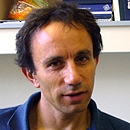Advisory Board and Editors Computational Biology

Ugo Bastolla
I got my PhD in Physics at Rome University, working with Luca Peliti and Giorgio Parisi on biologically inspired problems: evolutionary models and Boolean networks. Since then, I have always been interested in computational biology: Protein folding, Stability and population biology constraints in protein evolution, Conformation changes in proteins, Structural evolution of proteins, Theoretical ecology, Ecological interactions among microorganisms.

Gerrit T.S. Beemster
Professor of Biology at the University of Antwerp. Member of the Flemish Science Foundation review board. Editor of the journals Journal of Plant Research, Frontiers in Plant Science and PLOS ONE

Asa Ben-Hur
My lab specializes in applications of machine learning in bioinformatics. We are developing methods for predicting protein function and interactions, and are studying the process of alternative splicing in plants

Anne Bergeron
Member of the "Laboratoire de combinatoire et d'informatique mathématique" (LaCIM) of Université du Québec à Montréal, that initially explored the interplay between combinatorics and computer science. In the mid 90s, it began to include computational biology in the mix.

Joanne Berghout
Dr. Berghout received her PhD in Biochemistry from McGill University in Montreal, QC where she researched the genetics of complex traits and susceptibility to infectious disease in humans and mouse models. Following that, she spent three years as the Outreach Coordinator for the Mouse Genome Informatics (MGI) database in Bar Harbor, ME. There, she trained researchers in genetics, genomics, data structures and data mining to answer biological questions, and worked closely with other members of the MGI group to develop and optimize the MGI resource. Now her research interests include genetics of all kinds, personalized medicine, big data, and scientific communication. She is currently pursuing projects in precision medicine for analysis of transcriptome data from patients with rare lung diseases (Sarcoidosis, Coccidiomycosis), and integrative network analysis of complex traits including Alzheimer's Disease. She is currently appointed at the University of Arizona's Center for Biomedical Informatics and Biostatistics (CB2) and The Center for Genetics and Genomic Medicine (TCG2M) in Tucson, AZ.

Gorka Bidegain
Gorka Bidegain (GB) is a Senior Lecturer of the University of the Basque Country at the Department of Applied Mathematics. His main research interests lie within marine ecological and population dynamics modelling, including disease ecology and pathogen transmission. He conducts laboratory/field experiments and uses advanced mathematical and computational ecological modelling techniques to identify and asses the population and ecosystem responses to pressures and ecological and environmental heterogeneities. GB is developing new models, methodologies and algorithms with implications for the understanding of how climate variability interacts with marine populations and host-pathogen systems.
GB has participated in more than 20 national and international R&D competitive projects including three EU projects and three National Science Foundation (NSF). GB has published more than 25 articles in top rank peer reviewed journals, 3 book chapters, several scientific/technical reports and open access computer codes and Graphical User Interface for disease modelling (R, Matalab).
He is member of the Ecology of Infectious Marine Diseases Research Coordination Network (EIMD-RCN) (Cornell University, USA). He is also member of the Marine Biological Association and the Estuarine and Coastal Sciences Association

Alexander Bolshoy
Dr. Bolshoy has completed his PhD from the Weizmann Institute of Science in 1993. He is the author of the book "Genome Clustering: from linguistics models to classification of genetic texts", Springer-Verlag, 2010, and many scientific articles. He is serving as an editorial member of several reputed journals like Bioinformatics and Biology Insights, Computational Biology and Chemistry, ISRN Bioinformatics; and Linguistic Frontiers.

Tossapon Boongoen
Dr Tossapon Boongoen obtained his PhD in Computer Science from Cranfield University, UK (in 2003), and his 2-year PostDoc in Aberystwyth University, UK (2007-08). His research interest includes AI, machine/deep learning, image analysis and pattern recognition, fuzzy systems and security. He serves as an Associate Editor for several international journals like IEEE Access.

Glen M Borchert
Dr. Glen Borchert holds joint appointments as an Assistant Professor in Biology and Pharmacology at the University of South Alabama. He originally received a B.S. in Biology from the University of Tennessee then completed a Ph.D. in Genetics from the University of Iowa. Dr. Borchert’s research focuses largely on identifying novel genetic regulators and defining their roles in oncogenesis, microbiology and speciation. Since starting his laboratory at South Alabama in August 2012, Dr. Borchert has published dozens of papers in peer reviewed journals and had numerous grant applications funded including a highly prestigious NSF CAREER award (2014-2019).

Edward L Braun
Professor of Biology, University of Florida; member of UF genetics institute and Affiliate Curator Florida Museum of Natural History

Saverio Brogna
Lecturer and principal investigator at the School of Biosciences of the University of Birmingham, UK. Interested in eukaryotic gene expression and particularly in understanding the links between RNA processing and translation.
At present his group research focuses on understanding nonsense mediated mRNA decay (NMD) and its links with pre-mRNA splicing.

C. Titus Brown
Titus Brown received his BA in Math from Reed College in 1997, and his PhD in Developmental Biology at Caltech in 2006. He has worked in digital evolution, climate measurements, molecular and evolutionary developmental biology, and both regulatory genomics and transcriptomics. His current focus is on using novel computer science data structures and algorithms to explore big sequencing data sets from metagenomics and transcriptomics.

